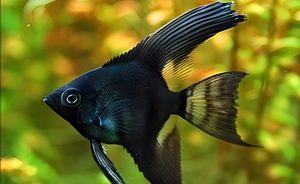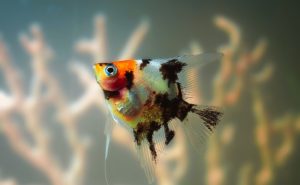How can you tell if your betta fish is happy? Ever wondered if your betta fish is truly happy in its tank? These stunning aquatic companions, known for their vibrant colors and flowing fins, are more than just beautiful—they have unique behaviors that reflect their emotional well-being. Understanding how to tell if your betta fish is happy is key to ensuring it lives a healthy and fulfilling life.
Whether you’re a first-time betta owner or an experienced aquarist, recognizing signs of happiness can deepen your bond with your finned friend.
One of the clearest signs of a happy betta is its active and energetic movement. A content betta will explore its tank with curiosity, darting around playfully and responding to your presence with excitement.
It won’t linger in one spot for long or display lethargy. Instead, its graceful and lively swimming patterns show it feels safe and comfortable in its environment.
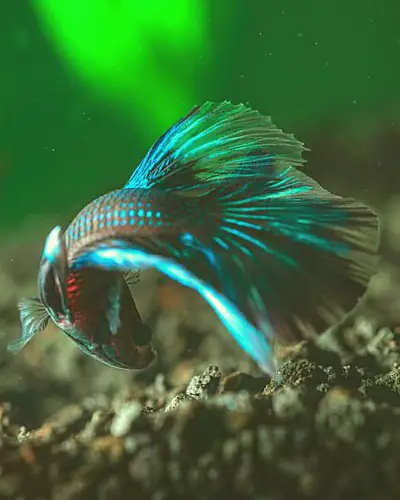
In this guide, we’ll explore other telltale signs of happiness in bettas and offer tips on creating the perfect environment to keep them thriving. Dive in to learn how to give your betta the care it deserves!
Table of Contents
ToggleHow to Tell If Your Betta Fish Is Happy?
How to tell if your Betta is happy? Observing your Betta’s behavior is key to understanding their mood and well-being. A happy betta is a vibrant and active explorer, while a stressed betta fish will exhibit different signs.
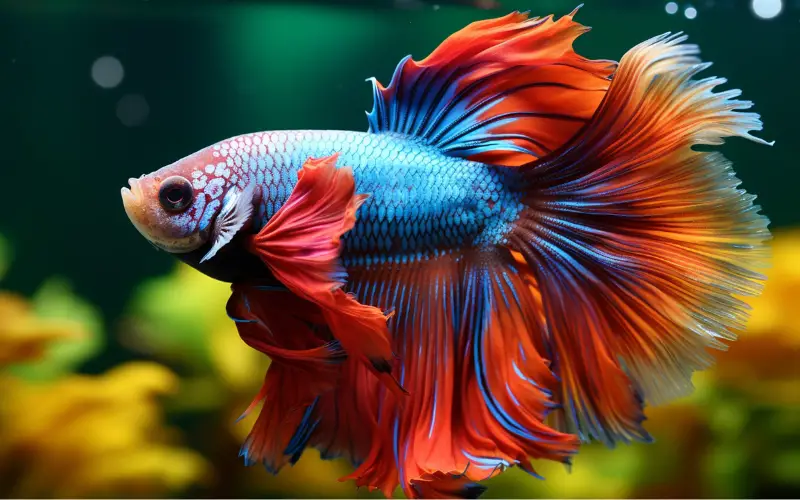
It’s essential to regularly monitor your Betta’s behavior and promptly address any signs of stress or unhappiness.
A suitable environment with proper water parameters, a balanced diet, and enrichment activities can contribute to your Betta’s overall well-being and happiness. Here are some telltale traits of a contented betta:
7 Subtle Signs of a Happy Betta Fish
Betta fish, also known as “Siamese fighting fish, are beautiful and popular aquarium fish. They are relatively easy to care for, but making your betta happy and healthy is essential. Here are seven subtle signs of a happy betta:
- Active and Alert: A happy betta fish will be active and alert. It will swim around the tank, explore its surroundings, and interact with its mates. It will also be interested in its food and readily eat when offered.
- Bright Colors: A happy betta fish will have bright and vibrant colors. Its fins will be full and flowing, and its body will be free of parasites or diseases.
- Flaring Gills: When a betta fish is happy and excited, it may flare its gills. This is a normal behavior that is not a sign of aggression.
- Building Bubble Nests: Male betta fish build bubble nests to attract mates. If your male betta fish is building bubble nests, it is a sign that he is happy and healthy.
- Playing with Decorations: Betta fish are intelligent fish that enjoy playing with decorations in their tank. If your fish is playing with its decorations, it is a sign that it is happy and bored.
- Eating a Varied Diet: A happy betta fish will eat a varied diet of pellets, flakes, and frozen or freeze-dried food. It will also readily eat brine shrimp or bloodworms as a treat.
- Clear Eyes: A healthy betta fish will have clear eyes. Cloudy or red eyes are a sign of illness.
If you notice these signs, your betta fish is happy and healthy. However, take your fish to the vet if you notice any signs of illness, such as lethargy, loss of appetite, or fin rot.
Normal Betta Behavior:
Their curious and active nature characterizes normal Betta behavior. These fish are known for their vibrant colors and long flowing fins, and they are often seen exploring their environment or flitting around their tank.
Bettas are also known to be territorial, especially the males, and may display aggression towards other fish or their reflection. It’s not uncommon for a Betta to flare its gills and puff out its fins as a display of dominance.
When it comes to feeding, Betta fish are voracious eaters and will eagerly swim to the surface to snatch up their food. They also interact with their owners, recognizing them and eagerly approaching the tank when someone comes near.
A healthy Betta fish will exhibit various healthy behaviors, from active swimming and exploring to territorial displays and interactive responses to their environment.
Do Bettas Make Bubble Nests?
Yes, bettas, particularly male bettas, are known for making bubble nests. These are clusters of bubbles that they build on the water’s surface.
The nests are made by coating their mouth with a special mucus that helps trap air bubbles as they gulp air from the surface. They then carefully arrange the bubbles together to form a nest.
Bubble nests are used for breeding purposes. The male Betta will build the nest as a place to protect the eggs once they are fertilized. He will also use the nest to attract a female betta.
If a female is interested, bettas swim to the nest and lay her eggs. The male will then fertilize the eggs and guard them until they hatch.
Even if no female betta is present, male bettas may still build bubble nests. This is because making a bubble nest is a natural behavior for them. Building nests helps relieve stress or boredom.
Can Betta Fish Get Depressed?
It is a common misconception that betta fish can experience emotions such as depression. In reality, betta fish do not have the same brain structure as mammals, making it highly unlikely for them to feel emotions like humans do.
However, betta fish can show signs of stress and lethargy if their environment is unsuitable for their needs. Poor water quality, inadequate tank size, or incompatible tank mates can lead to betta depression.
Betta fish owners must provide a proper habitat with clean water, suitable Betta’s tank decorations, and a balanced diet to ensure their betta fish remains healthy and active.
While Betta fish can certainly exhibit behaviors that we might interpret as analogous to human depression, such as:
- Lethargy: Loss of interest in swimming or exploring the tank.
- Loss of appetite: Refusing to eat or eating significantly less than usual.
- Flaring less: Losing their usual vibrancy and color.
- Hiding excessively: Spending more time tucked away in hiding spots than usual.
How to Make Betta Fish Happy: (Keeping Your Betta Fish Happy)
To ensure the happiness of your BettaS, it’s crucial to provide them with a suitable environment. This includes a tank size of at least 5 gallons, a heater to maintain a temperature of 78-80°F and plenty of live or silk plants for them to explore.
Betta fish also need a varied diet, so feed your Betta a mix of high-quality pellets, frozen or live food, and occasional treats like bloodworms or brine shrimp. Regular water changes and filtration systems are essential for maintaining good water quality, which is crucial for the health and happiness of your Betta.
Additionally, providing them with enrichment activities, such as interactive toys and objects you can get from your nearby pet store to investigate, can help keep them mentally stimulated. Meeting these basic care requirements ensures that your fish is happy and healthy in their home.
Healthy Betta Fish Vs Unhealthy: A Tale of Two Tails
Healthy Betta fish are a wonder to behold, with their vibrant colors, active swimming, and complete, flowing fins. On the other hand, an unhealthy Betta fish can present a stark contrast. A Betta fish suffering from poor health may exhibit symptoms such as lethargy, loss of appetite, dull or faded coloring, and clamped fins.
A sick betta fish may also show signs of disease, such as fin rot or fungal infections. The environment in which a Betta fish is kept plays a crucial role in its overall health and well-being.
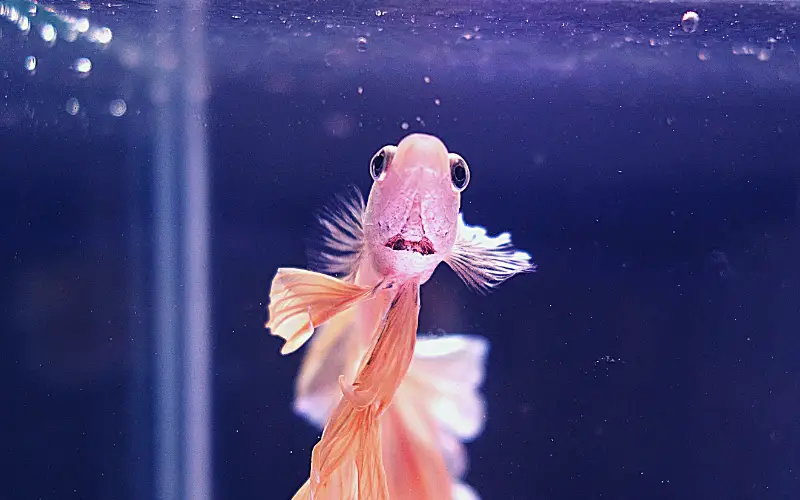
A clean, well-maintained betta tank with appropriate water parameters and regular water changes can promote the health of a Betta fish. At the same time, an unsuitable or dirty environment can lead to stress, disease, and a shortened lifespan.
By providing proper care and monitoring for any illness signs to look for, Betta fish can thrive and display their true beauty, enhancing the joy and satisfaction of their caretakers.
Let’s dive into the key differences between a healthy and unhealthy betta:
Healthy Betta:
- Appearance: A healthy betta boasts vibrant colors that shine and shimmer. Their fins are full and flowing, held proudly aloft as they explore their underwater domain. Their body is sleek and streamlined, with no visible lumps or sores.
- Behavior: A happy betta is active and interested, zipping around the fish tank, interacting with their environment, and flaring their gills at their reflection (showing off!). They readily greet you when you approach the tank and may even follow your finger along the glass.
- Appetite: A healthy betta has a healthy appetite, readily gobbling pellets or flakes. They should be eager to eat at least twice a day.
Unhealthy Betta:
- Appearance: An unhealthy betta may appear dull and faded, with muted or washed-out colors. Their fins may be torn, clamped, or even missing chunks. The body might be emaciated or bloated, and sores or raised scales could be present.
- Behavior: An unhealthy betta is often lethargic, spending most of their time hiding or resting on the bottom of the tank. They may gasp for air at the surface, have difficulty swimming, or show a general lack of interest in their surroundings.
- Appetite: An unhealthy betta may have a reduced appetite, showing little interest in food or only nibbling. In some cases, they may even refuse to eat altogether.
Red Flags:
- Cloudy eyes
- Bulging eyes
- Fin rot
- Clamped fins
- Lumps or sores on the body
- Unusual swimming behavior
Remember: Early detection is critical! Taking action immediately is essential if you notice these signs in your Betta. Consult a fish veterinarian or experienced aquarist for proper diagnosis and treatment. With prompt care, your Betta can bounce back and regain their vibrant health and playful personality.
Bonus Tip: Providing your Betta with a clean, well-maintained tank, a healthy diet, and plenty of hiding places can go a long way in keeping them happy and healthy.
By understanding the differences between a healthy and unhealthy betta, you can ensure your bettas live a long and fulfilling life, bringing you endless joy with their underwater antics.
Tips for Keeping Your Betta Fish Healthy and Happy
Here are some top tips to keep your Betta thriving and full of personality:
- Spacious digs: despite their reputation for living in bowls, Bettas crave space to explore and swim. Aim for a minimum 5-gallon tank, but bigger is always better! Think of it as your Betta’s underwater palace.
- Warmth and cleanliness: Bettas are tropical fish, so keep their water temperature between 78-82°F (25-28°C). Invest in a reliable thermometer and heater to ensure their comfort. Regular water changes, around 25% every week, are crucial to remove waste and keep the environment healthy.
- Filtration finesse: A gentle filter is essential for maintaining good water quality. Opt for one with adjustable flow, as Bettas don’t like strong currents. Remember, clean filters are happy filters, so regular maintenance is vital.
- Foodie fun: Bettas are carnivores, so feed them a varied diet of high-quality pellets, flakes, and frozen or freeze-dried foods like bloodworms and brine shrimp. Don’t overdo it, though, as overfeeding can lead to health problems. Twice a day, small pinches of food are plenty.
- Plantastic pals: Live plants are beautiful decorations; they also help keep the water clean and provide hiding spots and enrichment for your Betta. Opt for Betta-friendly plants like Java moss, Anubias, and Amazon swords.
- Hide-and-seek haven: Bettas appreciate having places to retreat and feel secure. Add caves, driftwood, or even silk plants to create hideaways for your fishy friend.
- Mirror, mirror on the wall: Bettas can be territorial, but they also love to flare their fins at their reflection. Hang a small, unbreakable mirror on the tank’s outside for fin-tastic entertainment (remove it if your Betta seems stressed).
- Stimulate the senses: Bettas are intelligent fish who get bored quickly. Offer enrichment activities like floating ping-pong balls, colorful objects to chase, or even labyrinths made from aquarium plants. You can even “talk” to your Betta by moving your finger outside the glass!
Commonly Asked Questions about Signs Your Betta is Happy (FAQs)
Why does my betta fish puff out his gills and Fins?
A betta fish puffs out its gills and fins as a display of aggression or when it feels threatened. It’s a natural behavior that helps intimidate rivals or predators.
How can you keep betta fish healthy and happy?
To keep betta fish happy and healthy, provide a proper-sized tank with clean, warm water, a balanced diet of high-quality betta food, regular water changes, and a stimulating environment with hiding places and plants.
Why can’t Betta fish live together?
Betta fish, especially males, are fiercely territorial and prone to aggressive fights that can lead to injury or death when housed together. Their flowing fins make them easy targets, escalating conflict. Consider alternative tank mates like shrimp or snails for peaceful coexistence.
How can you tell if betta fish are happy in the tank?
How to tell if a betta fish is happy? Watch for vibrant colors, active swimming, flared fins, and curiosity! Healthy appetite, bubble nests (males), and interaction with you all signify a happy betta. Avoid clamped fins, lethargy, and hiding – signs your betta fish need some TLC.
How do you tell if your betta fish likes you?
Bettas don’t express “liking” like humans. Watch for positive interactions like following you with interest, perking up at feeding time, and even “greeting” you by swimming near the tank.
How to tell if your female bettas fish is happy or sad?
How can i tell if my betta fish is happy? Vibrant colors, active swimming, exploring their tank, and greeting you with curiosity! Sad bettas? Clamped fins, hiding, lethargy, or loss of appetite.
How do I know if my betta fish is doing well?
How do you know if your betta fish is happy? Watch for these “good signs”: vibrant colors, lively swimming, flared fins, and a healthy appetite. Bonus points for bubble nests (males) and curiosity towards you!
What is normal betta fish behavior?
Betta fish exhibit territorial behavior, flaring their fins and displaying vibrant colors. They are known for their aggressive nature towards other bettas, often engaging in fights.
Do betta fish get excited to see you?
Bettas may not “excite” like humans, but they can recognize you! Look for increased activity, swimming to the front of the tank, and even “flared” fins as signs they associate you with positive things like feeding or interaction. It’s not love, but it’s fishy friendship!
How do betta fish show affection?
Betta fish show affection through various behaviors, such as following their owners’ movements, swimming excitedly, and even “dancing” when they see their favorite person. They may also display signs of recognition and respond positively to interaction.
How do you bond with a betta fish?
Whisper, hand-feed treats, watch with interest, add enriching toys & plants. Bettas may not cuddle, but patience & care build a vibrant, interactive fin-friend!
Conclusion
So, how can you tell if your betta fish is happy? Observe its behavior and environment to know if your betta fish is happy. A happy betta fish is active and nosy, swimming around its tank and exploring its surroundings. It will also be eager to eat and will have a healthy appetite. A happy betta fish will also display vibrant and bright colors, indicating good physical health. Furthermore, a well-maintained and clean tank with appropriate water parameters, filtration, and decorations will contribute to your Betta’s happiness.
If you notice your betta fish hiding, becoming lethargic, or displaying dull colors, it may indicate that it is stressed or unhappy. In such cases, assessing and improving its living conditions is vital by checking the water quality, providing adequate hiding spots, and ensuring proper feeding. So, how to tell if your betta fish is happy? Paying attention to your betta fish’s behavior, appearance, and tank conditions will help you determine if it is comfortable and thriving in its environment.
You might also like
- How to Tell If Your Betta Fish Is Unhappy & Why It Matters?
- Betta Fish Female Vs Male: Key Differences (Which is Better)
- Choosing the Best Betta Fish Tankmates: (The Ultimate Guide)
- Betta Fish Tumor 101: Symptoms, Causes & Proven Treatment!
- 7 Reasons Betta Fish Flaring Its Gills & (How to Handle It!)
- Do Betta Fishes Sleep: Top 10 FAQs (How, When, and Where)
- My Betta Fish Won’t Eat and Barely Moves: Solved & Explained
- Do Betta Fish Know Their Owners: (The Surprising Bond)
- How Often Clean Betta Tank: (Essential Guide!)


